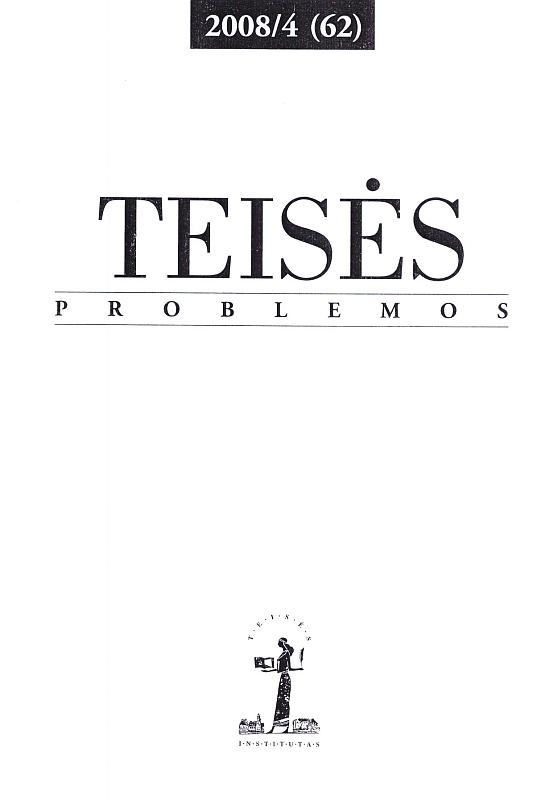Laisvės atėmimu iki gyvos galvos nuteistų asmenų lygtinis paleidimas: tarptautiniai standartai, užsienio šalių patirtis ir pasiūlymai Lietuvai
Release on Parole of Life-Sentenced Persons: International Standards, Foreign Experience and Proposals for Lithuania
Author(s): Skirmantas Bikelis, Gintautas SakalauskasSubject(s): Law, Constitution, Jurisprudence, Criminal Law, Penal Policy
Published by: Lietuvos teisės institutas
Summary/Abstract: The article provides an analysis of the international standards, foreign theory and practice relating to parole of life-sentenced persons; a legal and practical situation is presented, and proposals on how it should and could be changed are given. Life imprisonment in many countries of the world is imposed as the strictest penalty for the gravest crimes. On the other hand, the concept of that penalty as used in the Lithuanian and many other languages has not been in conformity with its essence and contents since of long – most often this penalty is not served “lifelong”, foreseeing milder or stricter legal conditions, with the existence of which a persons sentenced to this penalty may be released (on parole) from the place of imprisonment. This article is devoted to analysis of international standards relating to the execution of life sentence as well as analysis of the European Union legislation and practice in this field, presentation of the situation in Lithuania. In Lithuania, neither the Criminal Code nor the Code of the Execution of Penalties provides the opportunity of release (on parole) of a life-sentenced person, except for petition for mercy or amnesty procedure. This principal position, according to which release on parole is not possible by applying the legal provisions of release on parole, and the execution of life sentence in common cases should be continued to the death of the convicted person, makes Lithuania distinguishable from the European Union legal-cultural space (as previously for the long time it was distinguished due to the imposition of death “penalty”). At the end of analysis, the possible legal ways for solution of this problem are proposed which could be selected taking into account the proposals of the institutions and persons concerned with the solution of this problem as well as the generalized discussions. Seeking that Lithuanian penal laws would be in conformity with the constitutional principles, international standards and would be consecutive, primarily, it would be necessary to reject the categorical restrictions, foreseen in the Part 3 of Article 77 of the Criminal Code and Article 158 of the Code of the Execution of Penalties, to apply the release on parole or on probation. In addition, it is subject to discussion, whether those both institutions should not be joined together, establishing one general legal regulation of release on parole in Lithuania. While evaluating the opportunity of release on parole of life-sentenced persons, it would be important: 1) to determine the minimum term when life-sentenced persons (and/or the incarceration establishments) could apply to the court with the application to release them on parole (or replace that penalty by another penalty, for example, the termed imprisonment) (for example, after serving 20 years of penalty); 2) to determine the mandatory probationary period of release on parole (for example, up to 5 years); 3) not to restrict the opportunity of release on parole to the life-sentenced persons who had no opportunity of compensating property damage caused due to the crime (in this case, it would be more rational to relate the opportunity of release on parole of life-sentenced persons with Art. 157 of the CEP rather than with Pt 1 of Art. 77 of the CC, if it would be decided to leave those two articles); 4) not to limit the opportunity of release on parole of the life-sentenced by any categories of the sentenced (as it is established by applying the release on parole to the persons sentenced to the termed imprisonment), keeping as the main criterion the probability of danger of the person to the society, established by performing the psychological and social expertise of the convict; 5) to provide for the mandatory supervision of the Parole Service (correctional inspectorate); 6) to enforce the mandatory short-term visit home prior to releasing the life-sentenced convicts on parole (for example, as it was enforced in Finland, Germany); such a mandatory visit could be provided for all persons released on parole.
Journal: Teisės problemos
- Issue Year: 2008
- Issue No: 62 (4)
- Page Range: 23-66
- Page Count: 44
- Language: Lithuanian

